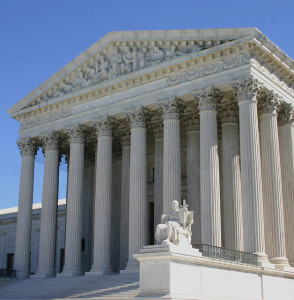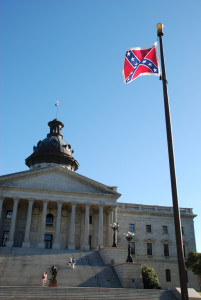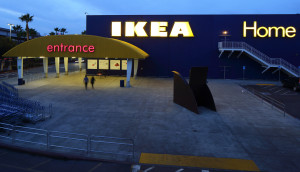By Jackie Faye June 26, 2015
Obamacare Wins

U.S. Supreme Court ©David
Obamacare was upheld again in a ruling by the Supreme Court Thursday.
It is the second time in three years that the legislation has been challenged in the Supreme Court. House Speaker John Boehner promised to continue the fight, but given the assertive language of the Thursday decision, many argue it will ensure the Affordable Care Act remains in place long after Obama has left office.
The 6-3 vote holds that despite confusing language in the legislation, federal tax credits can be offered not only to Americans who purchase insurance on state-run exchanges, but also to those who get insurance on a federal exchange. About 6 million people in three-dozen states get tax subsidies on insurance purchased on a federal exchange.
“Congress passed the Affordable Care Act to improve health insurance markets, not to destroy them,” Chief Justice John G. Roberts Jr. wrote for the majority. “If at all possible, we must interpret the Act in a way that is consistent with the former, and avoids the latter.”
Those voting in favor included Justices Roberts, Anthony Kennedy, Sonia Sotomayor, Ruth Bader Ginsburg, Elena Kagan and Stephen Breyer, while the court’s three most conservative justices voted against—Antonin Scalia, Clarence Thomas and Samuel A. Alito Jr. Scalia called the arguments of the majority “absurd” and “interpretive jiggery-pokery.”
“Five years ago, after nearly a century of talk, decades of trying, a year of bipartisan debate, we finally declared that in America, health care is not a privilege for a few but a right for all,” Obama said from the White House. “The Affordable Care Act is here to stay.”
Retailers Pull Confederate Flag Products

Confederate flag at the statehouse in Charleston, South Carolina ©Peter Dutton
A slew of companies this week announced plans to pull merchandise bearing the Confederate flag.
Walmart, Sears/Kmart, eBay, Amazon, Etsy and Google Shopping all announced they would begin removing the controversial products, while Apple said it would remove Civil War games that bear the flag from its app store.
The moves come as a heated national debate has erupted over the continued use and visibility of the Confederate flag in the wake of a deadly shooting at a predominantly African American church in Charleston, South Carolina just over a week ago. The suspect, Dylann Roof, 21, was featured on white supremacist websites burning the American flag and waving a Confederate one. The Confederate flag still flies on Charleston government grounds.
Before the Civil War, South Carolina was the first state to succeed from the Union and it was the last state to remove the Confederate flag from its statehouse dome. In July 2000, the flag was taken down and transferred to a monument directly in front of the Capitol building.
Even as companies vowed to discontinue items featuring the Confederate flag, sales of them soared. Some Confederate flag items on Amazon saw sales spike by more than 5,000 percent.
Bailout Woes in Greece

Alexis Tsipras, Syriza, source: FrangiscoDer – Eigenes Werk. Lizenziert unter CC BY-SA 3.0 über Wikimedia Commons.
Greece made some progress on a bailout deal after talks with international creditors broke down on Thursday. The country owes $1.6 billion in repayments on June 30.
On Friday, the troubled country agreed to cut pensions to a level close to what its creditors demand. Earlier this week, Greek Prime Minister Alexis Tsipras promised $9 billion in budget savings over two years, but creditors complained these savings relied too heavily on business taxes that could hurt growth.
Some now expect a breakthrough over the weekend. “Tomorrow’s meeting is of decisive character,” German Chancellor Angela Merkel said after meeting Tsipras and French President Francois Hollande, according to Al Jazeera English. European Commission President Jean-Claude Juncker agreed.
Greece and its creditors have clashed over what economic reforms the country must make to receive the final 7.2 billion euros in its international bailout program, which are currently on hold. Tsipras was elected in January on promises to roll back the austerity measures dictated by its $261 billion bailout package.
Meanwhile, the European Central Bank extended additional emergency credit to Greek banks last week as they struggle with growing cash withdrawals from Greek citizens worried about the country’s financial future.
Thousands marched through the streets of Athens Thursday, primarily from radical anti-capitalist group Antarsia (Anticapitalist Left Cooperation for the Overthrow), far to the left of Tsipras’ Syriza party. The protestors, who marched to parliament, demand that Greece leave the European Union and writes off its debt.
IKEA Workers Get A Raise

Ikea ©Don McCullough
Following in the steps of many other big retail chains in the U.S., IKEA announced plans to raise its minimum wage for employees this week. Starting next year minimum wage for IKEA workers will be $11.87 an hour, up from $10.76. Currently, the federal minimum wage is $7.25.
The furniture giant also announced that its five distribution centers in the U.S. and its three non-retail locations will also set minimum wages above the local living wage, and no one will make below $10 an hour. The decision will impact around a third of IKEA’s 15,000 workers.
Last year, IKEA decided to base its pay scales on local indexes of the cost of living, which factored in things like housing and food—that decision added on average a 17% padding to employee paychecks.
Back in April, McDonalds announced it would be raising its minimum wage, after which several other American retailers followed suit, including Target, Wal-Mart, T.J. Maxx and the Gap.
Top Performance Does Not Mean Top Pay For CEOs
How closely aligned are the interests of shareholders and CEOs? Given all the ink dedicated to the outrageously high salaries of CEOs at American companies, you might think not very much. But the Wall Street Journal’s annual pay survey of 300 CEOs says otherwise: in general rising CEO compensation at large companies is correlated with strong shareholder returns, though of course there are exceptions to the rule.
The CEOs of the 10 companies that recorded the best returns in 2014 all got pay raises last year. Only two CEOs among the bottom 10 performers received raises—the rest received pay cuts.
Among the top ten best-paid CEOS, only two received raises in 2014 as shares of their companies declined in value. Viacom CEO Philippe Dauman, for instance, got a pay increase of 19% in 2014, bringing his compensation to $44.3 million, while shares of Viacom fell 6.6% on the year. The other eight best paid CEOs in the study got raises while shareholders made a nice return.
Rite Aid Corp delivered the best return to its shareholders at 292% for 2014. This coincided with a 6.5 percent pay increase for the company’s CEO John Standley, which brought his compensation to $8.3 million.
Weatherford International PLC delivered the worst return to its shareholders at a negative 26.1% for 2014. That didn’t bother the compensation committee: CEO Bernard Duroc-Danner got $14.9 million in salary last year, a 13.4% raise versus 2013.
Big discrepancies between shareholder value and CEO pay may one day be a thing of the past. The SEC is currently debating a rule that will require companies to show how pay for top executives tracks with investor returns.
This entry was posted on Friday, June 26th, 2015 at 6:43 pm. It is filed under Week in Review and tagged with Affordable Care Act, Alex Tsipras, CEO pay, Confederate flag, Greek bailout, IKEA, Obamacare. You can follow any responses to this entry through the RSS 2.0 feed.
Comments are closed.
